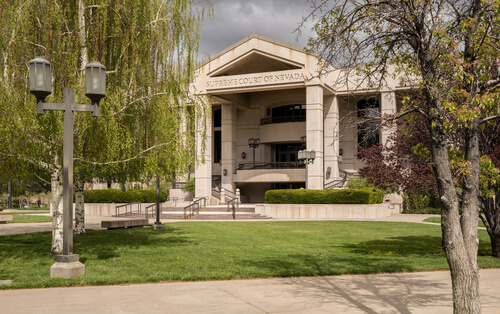Verification matters and here's why...
Learn moreSummary of Nevada Mechanic’s Lien Law
By Leon F Mead II & Sarah M. Thomas
Nevada’s mechanic’s lien law is unique in the United States. In re Fontainebleau Lien Litigation, 289 P.3d 1199, 1211 (Nev. 2012).
For this reason, an understanding of the statutory requirements for perfecting and enforcing a mechanics lien claim is critical for any contractor or material / equipment supplier performing work or supplying materials or equipment to Nevada construction projects.

The following is a general summary of the key issues for enforcing a mechanics lien in Nevada. It does not encompass all issues that may affect the enforceability or validity of your mechanics lien in Nevada. Therefore, this summary should not be considered legal advice.
Please consult a Nevada licensed and mechanics lien experienced attorney before taking any action on a mechanics lien claim in Nevada.
Need help? Give us a call (800) 722-2422
Proper License
Preliminarily (and critically), if a contractor’s license is required to perform the work for which a lien claimant is seeking a lien in Nevada, the lien claimant must have the required classification license as well as an adequate contract license limit amount.
The Nevada State Contractors Board issues a specific limitation on the maximum contract amount a licensee may perform when issuing a license.
A contractor entering into a contract in excess of that limit amount is considered unlicensed, with very limited exceptions.
Submitting a bid in excess of the license limit makes a contractor subject to administrative discipline.
An unlicensed lien claimant (when a license is required) has no right to record a lien (NRS 108.222(2)), and has no right to recover for its performed work or enforce its contract (NRS 624.320).
Preliminary Notice / Actual Notice
In Nevada, a preliminary notice is called a “Notice of Right to Lien”. Unless a lien claimant has a direct contract with a Nevada project’s owner (NRS 108.245(5)), a lien claimant is required to serve a project’s owner with a Notice of Right to Lien within 31 days after first supplying labor, materials, equipment or services for the project. NRS 108.245(1). There are a few exceptions to this requirement, however:
- A lien claimant that “performs only labor” is excepted from this requirement (what is meant by “labor” here has not been defined);
- A union benefit trust fund or other person seeking to recover unpaid wages or benefits for work performed on a project is exempted, as well;
- By case law that is arguably wrongly decided, a lien claimant of whom a project owner has actual knowledge that it is performing construction work on its project, may also be exempt. The “actual notice” exception is potentially problematic, however, because if a lien claimant is required to serve a Notice of Right to Lien, the amount of its mechanics lien is limited to the value of work performed / materials or equipment provided during the 31 days prior to the service of the Notice of Right to Lien and thereafter (NRS 108.245(6)). This limitation was not discussed in the case law establishing the “actual notice” exception, and therefore lien claimants should not rely on that exception.
Residential (including Apartment) Projects
While not applying to commercial, industrial or other non-residential construction projects, should a lien claimant seek to record a mechanics lien on a single family or multi-family residential construction project it must serve a Notice of Intent to Lien not later than 15 calendar days prior to recording its Notice of Lien.
If the Notice of Intent to Lien is served less than 15 days before the expiration of the time to record a Mechanics’ Lien, service of the Notice of Intent to Lien will extend the time to record the Mechanics’ Lien up to 15 days.
If the Notice of Intent to Lien is not served, a lien claimant may not record or enforce a Mechanics’ Lien on the project.
THIS DOES NOT APPLY TO NON-RESIDENTIAL PROJECTS!!!
It is critical to remember that serving a Notice of Intent to Lien on a non-residential use project WILL NOT extend the time to record a Mechanics Lien on that Project.
This is a trap for the unwary and should be avoided at all costs.
Mechanics Lien Recording
A mechanics lien is perfected in Nevada by recording a Notice of Lien with the country recorder where some part of the Project is located.
There is a specific form in the statute (NRS 108.226) that must be used.
The Notice of Lien must be recorded within 90 days of the last date the lien claimant has performed work or provided materials and equipment to the project, or 90 days of the last labor or material and equipment performed / provided on the project, whichever is later.
Should a valid Notice of Completion be recorded on the project by its owner, a lien claimant who was properly served with the Notice of Completion must record its Notice of Lien within 40 days of the Notice of Completion being recorded.
Notices of Lien recorded after these time frames are not valid.
Once the Notice of Lien is recorded, it must be served on all owners of the project liened within 30 days of the Notice of Lien being recorded. The recorded Notice can be served by personal service or certified mail.
There is also a 30 day “cooling off” period after the Notice of Lien is recorded; that is, no lawsuit may be filed to enforce the Notice of Lien within 30 days after it is recorded.
Mechanics Lien Foreclosure / Enforcement
A Nevada mechanics lien is only valid for 6 months after it is recorded, unless a lawsuit to enforce the Notice of Lien is commenced in Court or a written extension of that time is recorded before that 6 months has expired.
An extension of time to enforce a Notice of Lien is rarely done and has specific requirements, so it should only be attempted by a Nevada licensed attorney, with experience in Nevada’s Mechanics Lien Law.
Similarly, it is likely necessary for a lien claimant to retain a Nevada licensed / Nevada mechanics lien experienced attorney to enforce the Notice of Lien.
In addition to filing a lawsuit to enforce the Notice of Lien within 6 months of it being recorded, Nevada law requires that Notice of Foreclosure of the Notice of Lien be filed and served on all other persons claiming a Notice of Lien on the Project, and a Notice of Lis Pendens be filed and recorded as well.
These are tasks that have specific requirements to complete, and should only be handled by a Nevada licensed attorney.
Other Remedies
Unlike other states, Nevada has no remedy allowing a lien claimant to serve a Stop Payment Notice. Nevada does have a Prompt Payment Act, however, that will allow a lien claimant to stop work when it has not been paid, under certain circumstances.
Nevada also will enforce a project-wide performance bond, if one is provided on the project.
As previously mentioned, none of these remedies should be attempted on your specific project, except under the guidance of a Nevada licensed / Nevada mechanics lien law experienced attorney.
Need help? Give us a call (800) 722-2422


